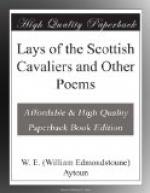Some years ago, while visiting the ancient Scottish convent at Ratisbon, my attention was drawn to the monumental inscriptions on the walls of the dormitory, many of which bear reference to gentlemen of family and distinction, whose political principles had involved them in the troubles of 1688, 1715, and 1745. Whether the cloister which now holds their dust had afforded them a shelter in the later years of their misfortunes, I know not; but for one that is so commemorated, hundreds of the exiles must have passed away in obscurity, buried in the field on which they fell, or carried from the damp vaults of the military hospital to the trench, without any token of remembrance, or any other wish beyond that which the minstrels have ascribed to one of the greatest of our olden heroes—
“Oh bury me by the bracken bush,
Beneath the blooming brier:
Let never living mortal ken
That a kindly Scot lies here!”
FOOTNOTES:
[Footnote 2: An account of Dundee’s Officers after they went to France. By an Officer of the Army. London, 1714.]
THE ISLAND OF THE SCOTS
I.
The Rhine is running deep and red,
The island lies before—
“Now is there one of all the host
Will dare to venture o’er?
For not alone the river’s sweep
Might make a brave man quail:
The foe are on the further side,
Their shot comes fast as hail.
God help us, if the middle isle
We may not hope to win!
Now, is there any of the host
Will dare to venture in?”
II.
“The ford is deep, the banks are
steep,
The island-shore lies wide:
Nor man nor horse could stem its force,
Or reach the further side.
See there! amidst the willow boughs
The serried bayonets gleam;
They’ve flung their bridge—they’ve
won the isle;
The foe have crossed the stream!
Their volley flashes sharp and strong—
By all the Saints, I trow,
There never yet was soldier born
Could force that passage now!”
III
So spoke the bold French Mareschal
With him who led the van,
Whilst rough and red before their view
The turbid river ran.
Nor bridge nor boat had they to cross
The wild and swollen Rhine,
And thundering on the other bank
Far stretched the German line.
Hard by there stood a swarthy man
Was leaning on his sword,
And a saddened smile lit up his face
As he heard the Captain’s
word.
“I’ve seen a wilder stream
ere now
Than that which rushes there;
I’ve stemmed a heavier torrent yet
And never thought to dare.
If German steel be sharp and keen,
Is ours not strong and true?
There may be danger in the deed,
But there is honour too.”




